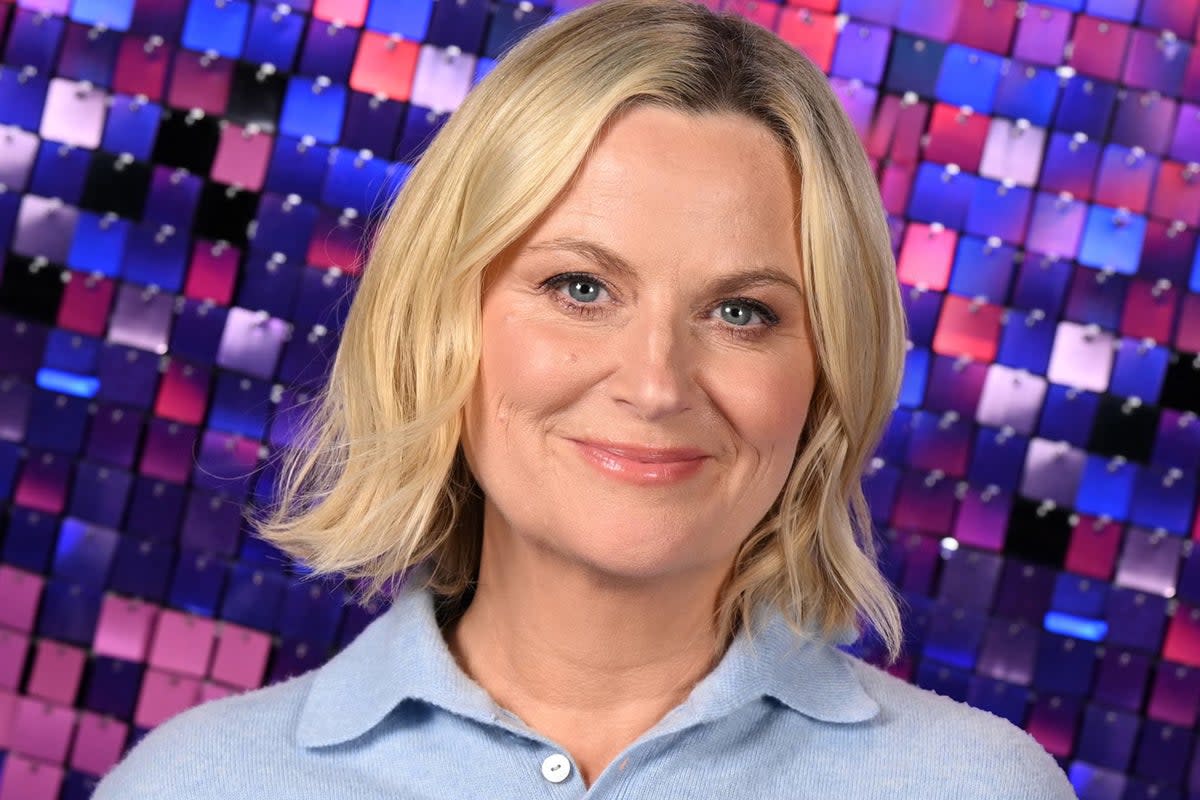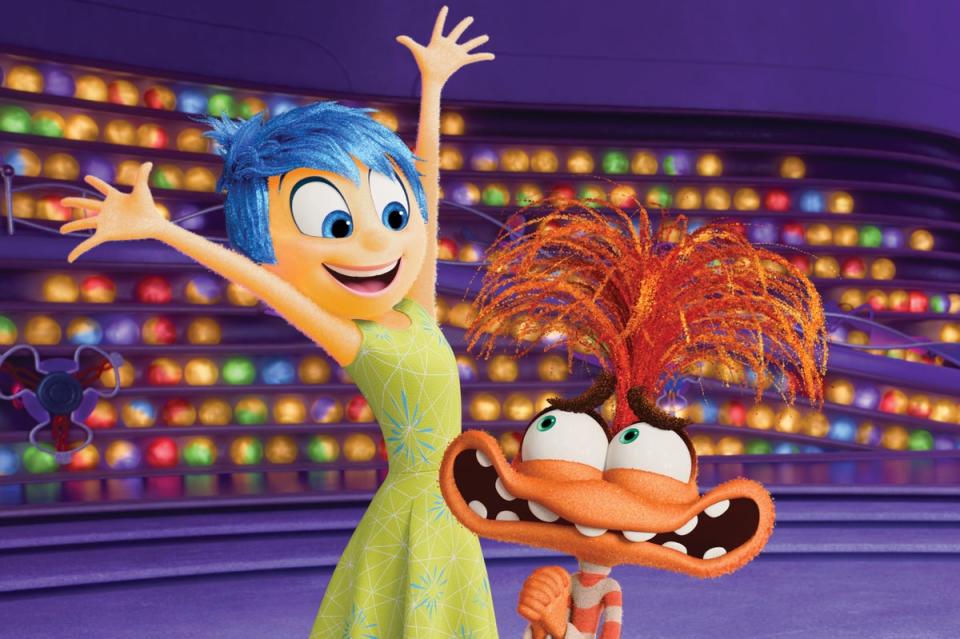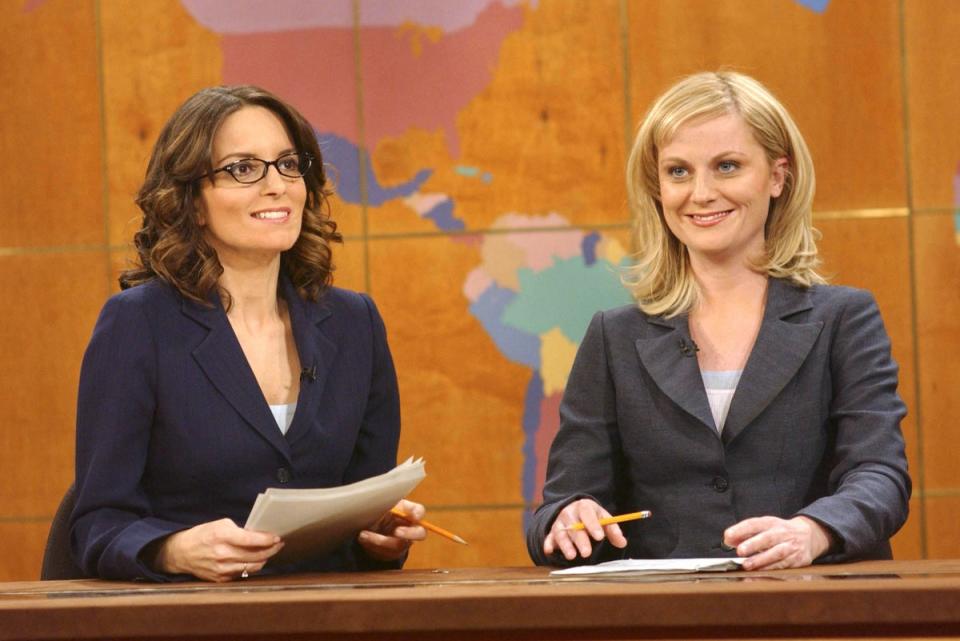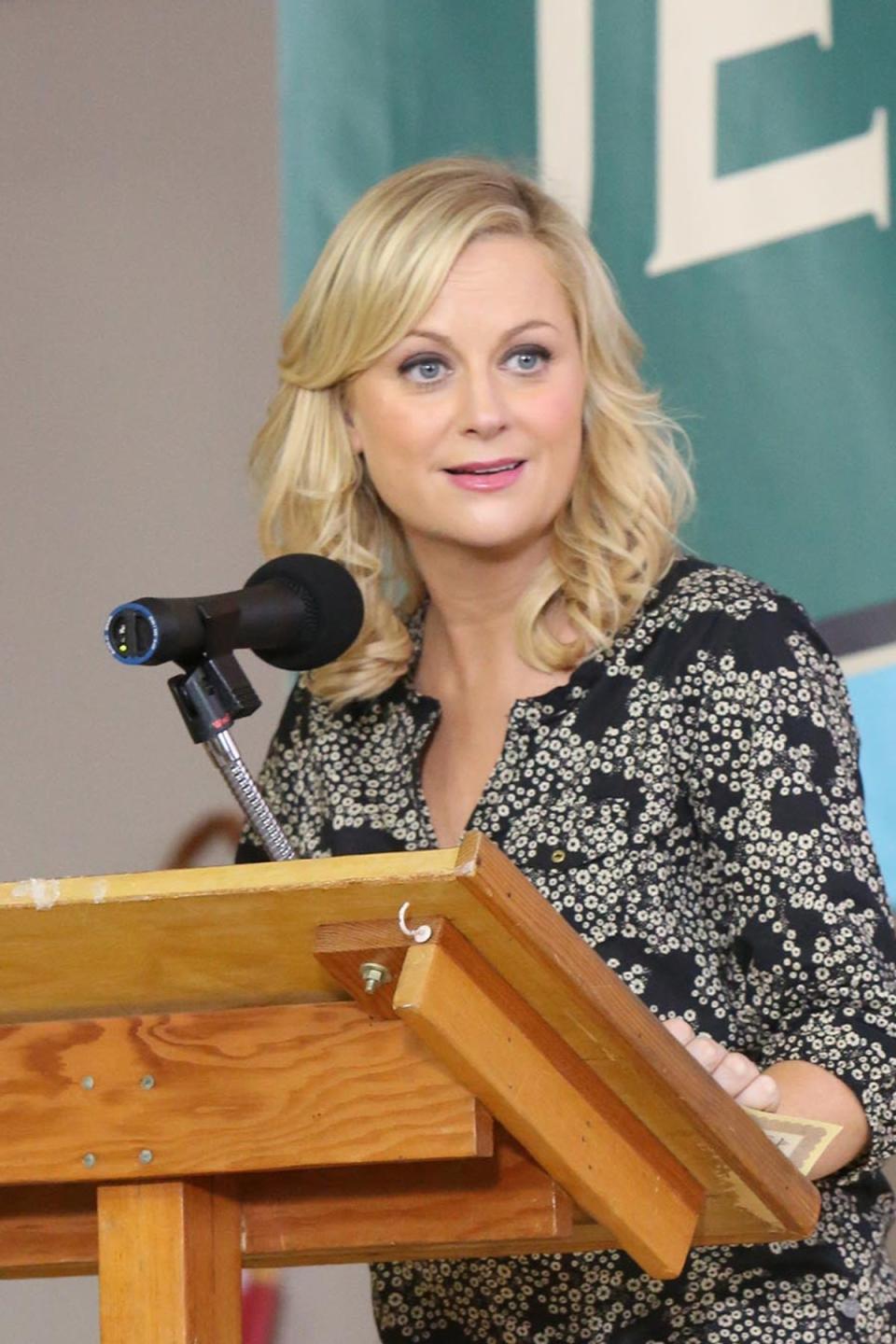Amy Poehler: ‘You don’t need to have a dysfunctional work environment to be funny’

Amy Poehler is a bit of a hypnotist. Here she sits, eyes fixed on me, voice honeyed, wisdom forthcoming. “It is your lifelong work to be as gentle with yourself as you can,” she soothingly tells me, and only me. (There are at least five people from Disney in the room with us.) “And you’ll get bonus points if you can use on others that same tenderness you try to use on yourself.”
Of course she is like this. Poehler’s most famous work – the scrappy US government comedy Parks and Recreation; voicing the emotion of joy in Pixar’s Inside Out – has been defined by its optimism, kindness and can-do pep. Basically the kind of shtick that could get pretty annoying. But something that makes that work so charming – and, by proxy, Poehler herself – is the fly that’s always there in the ointment. Sugar comes with salt. Joy with sadness. Local councillor Leslie Knope’s Obama-era pluck with a side of righteous rage. Poehler, in conversation, is not remotely annoying. Or even upbeat in a way that feels insincere. Yes, she is quick to reach for positive reinforcement, but she couches it in fact. Sure, the world isn’t great. Sure, it’s tricky to like yourself. Sure, she says, “we’re all dealing with the very human, very messy awfulness of being alive”. But…
For Poehler, there’s always a “but”. The Disney collective is sitting on either side of us because we’re meeting to talk about Inside Out 2, now in cinemas. Sequels, who needs ‘em? But… the original Inside Out, which dazzled kids and plunged adults into existential angst back in 2015, was a natural fit for follow-ups. It was set primarily in the head of 11-year-old Riley, an ordinary girl whose behaviours are managed by five anthropomorphic emotions: Fear, Sadness, Anger, Disgust and Joy. All five work in tandem with one another, shepherding a human who is increasingly inclined to grief and melancholy. Inside Out 2 gets even messier, with Riley turning 13 and her inner operating centre invaded by a flurry of new emotions, among them Anxiety, Envy and Embarrassment, who each fight for control. It is just as affecting a movie this time around, and complex and profound in ways the best of Pixar tends to be.
When she was Riley’s age, Poehler had her own voice in her head. She came to call this “the demon voice”, an inner monologue that’d tell her horrible, pointless things about how she looked and how she acted. It sounded like her, she wrote in her 2014 memoir Yes Please, “but strangled and seductive … like Darth Vader or an angry Lauren Bacall”.
“You kind of contain a good wolf and a bad wolf in you, right?” Poehler says today. “And the way we speak to and about ourselves can be pretty brutal. We would never say things to our friends that we would say to ourselves.” For young people, she thinks the ideas in Inside Out 2 – and the way Joy navigates those first hints of self-loathing – can help. “Pixar’s wish-fulfilment [hope] is to get in there before the demon gets in there.” But…? Poehler sighs, curling her lip. “But you really, truly can’t.” She laughs, a broad rat-a-tat-tat laugh that sounds like gunfire. “It’s just a never-ending project. And what’s funny is when you think it’s gone. Like, ‘OK! I’m good! Today’s a good day!’ But then there’s always someone in there, like – ‘Oh, hey, before you go out, are you sure you don’t think you’re a piece of garbage?’”
Garbage or not, though, she’s got stuff done. The 52-year-old has the kind of CV so huge that it’s easy to forget half of the things she’s worked on. She found fame on the US sketch institution Saturday Night Live, on which she starred from 2001 until 2008, rapping about Sarah Palin and impersonating everyone from Dakota Fanning to Anna Nicole Smith. She was a scary drama teacher in the cult comedy Wet Hot American Summer, and the archetypal, Juicy Couture-clad “cool mom” of Mean Girls. Parks and Rec ran from 2009 to 2015, a cultural comfort blanket before the rot set in. In 2021 she directed the teen-feminist comedy Moxie for Netflix. A year later she directed a documentary on the trailblazing comedian Lucille Ball. She has producer credits on some of the most idiosyncratic comedy series of the last 15 years, including Broad City, Difficult People and Natasha Lyonne’s trippy Russian Doll, and has hosted – alongside her BFF Tina Fey – the Golden Globes four times. Oh, and now she’s a comedy podcaster, playing an incompetent therapist on Say More With Dr? Sheila, and a murder suspect in the true-crime satire Women Talkin’ ’Bout Murder. She also sleeps, allegedly.
They’d be doing these really free and sexual scenes, and I’d go up to them and say, ‘Guys, if at any point you’re uncomfortable, we can stop.’ And they’d be like… ‘Amy, we wrote this’
Poehler has typically surrounded herself with funny women, and she’s at the centre of a murderer’s row of comedy friends and allies that include Maya Rudolph, Rachel Dratch and Fey. But it was a tribe that took time to find. Early on, when she discovered she could make people laugh while part of a Boston College improv troupe – she’d later, in 1991, co-found the noted comedy troupe The Upright Citizens Brigade – she was all about fitting in rather than standing out. “I really wanted to just hang with the guys,” she recalls. “And to figure out how to be one of the guys. It took me a long time to realise my femininity.”
She met Fey – as well as a raft of immediately recognisable “Oh, right, that guy!” comedy faces including Matt Walsh, Ed Helms, Paul Scheer and Rob Riggle – through the improv circuit, and spent the Nineties touring live shows around New York, performing in grungy pubs and defunct strip clubs. “Success for me has always felt better shared,” she says. “It feels bigger and more satisfying. And also, let’s be honest, it’s nice to fail with someone, too. Just to have someone to talk about it with over a beer.”

After orbiting the show’s cast and crew for a few years, she was hired for SNL shortly after Fey had become the show’s first female head writer – an auspicious role for a series that had historically been unkind to women. Julia Louis-Dreyfus, Jane Curtin, Janeane Garofalo and Nora Dunn are just some of the comic heavyweights who walked down the show’s sacred halls during its blokier eras – and hated it. Today Poehler says she lucked out.
“There were a lot of women even just 10 years ahead of me – both at SNL and in general in the business – who were the only women in the room, or one of two,” she says. “When I got to SNL, it was a time of super-strong, powerful, funny women, and Tina at the helm – I was very aware that other people had a completely different experience with it.”
The cycle has continued, too. She sometimes catches herself out when working with women who entered the business after her. In the very early days of producing Broad City, an occasionally scatological comedy series about two aimless young women pootling around New York, she’d get to set and worry about the safety of its stars, Abbi Jacobson and Ilana Glazer. “They’d be doing these really free and sexual scenes, and I’d go up to them and say, ‘Guys, if at any point you’re uncomfortable, we can stop.’ And they’d be like… ‘Amy, we wrote this’.” She laughs. “So it was new watching women have ownership of their own stuff, and being the gatekeepers. In my lifetime, I’ve watched that happen.”

Poehler speaks excitedly of the generations of funny people that have come up behind her – much of her producing work has also platformed new, young voices. But I’m also curious if she finds this approach unusual. If anything has defined modern discourse of late, particularly in the comedy world, it’s a tendency to punch down: kids are dumb, new ideas are stupid, the youth have gone woke. She finds it baffling. “As a middle-aged person, I’m shocked by the certainty people my age walk around with,” she says. “As if their experience and wisdom has solved all the problems. Look at the system that we’re in right now. Everybody rolls their eyes! But at what? I am the age of these people – I know that we don’t know what we’re talking about. Who are you fooling? You, with all your unresolved trauma and patriarchal bulls***.” Her voice ascends into a comic racket. “‘I’m one of you!’ Nice try!”
She calms. “We get really defensive because we don’t want to feel left out. We don’t want to feel checked out. And young people are very energetic. They have big opinions. And we get really scared. Have you been around a 15-year-old lately?” I haven’t, but Poehler has two sons, aged 15 and 13, with her former husband, the Arrested Development actor Will Arnett. “They’re doing OK. They sound like lawyers arguing at you, and they feel very intense, and it’s easy to just think, ‘Oh, they don’t get it’ – but just stay curious, stay open.” She starts down another road, but stops herself with a laugh. “Sorry, I’m pontificating.”

If there’s another thing Poehler can’t abide, though, it’s bad behaviour. Her time on SNL was a positive one, and she’s used it as a blueprint for sets ever since. Parks and Rec, for instance, proved something to her. “You do not need to have a chaotic or dysfunctional work environment to be funny or to be creative,” she says. “I don’t do great with people who want to fracture that feeling. I either get really defensive or really protective – I’ve got my stuff to work on. But I think once you prove that it works, it’s pretty hard to go back. I’ve sometimes gone to other places and I’m like, ‘Babe, it does not have to be this way – I’ve seen the other side, we don’t need to kill each other to make great stuff.’”
Poehler adored Parks and Rec. I did too – it was sweet, funny and quietly strange. With its evocative blend of small-town pride and gentle silliness, it felt, at its best, like the closest thing we’ve had to a live-action Simpsons. But, I tell her, I’m also a bit anxious about ever rewatching it. “Whyyyyy?” she pleads, as if I’ve just told her I’ve kicked a puppy. Because I worry it’d be slightly depressing now – a show that believed in a fundamental good. I worry, seen in the light of 2024 and the last decade on this planet, it’d read as slightly naive. “OK, I am going to tell you why you’re going to enjoy it,” Poehler says, with an eager insistence that is almost screamingly Knope-ian. “I do know what you mean, or that it might feel sad because we’re not there anymore, but…” There it is! “You’ve gotta remember that there were very unlike-minded people in that office. People in that office had very different ways of life, and came at work in completely different ways. But they solved things. It feels like a version of what things could be, if people could actually just take one more second to be with each other.”
She rewatched it during the pandemic with her sons, both of whom had never seen it before, and thinks it holds up. “I was really proud that it was still very funny,” she says. “That it felt like one big, really dysfunctional, messed-up family trying to get through dinner, which is what everybody’s still trying to do.” She insists once more that I rewatch it. It’s that hypnosis effect again. It’d feel wrong to not abide.
‘Inside Out 2’ is in cinemas


